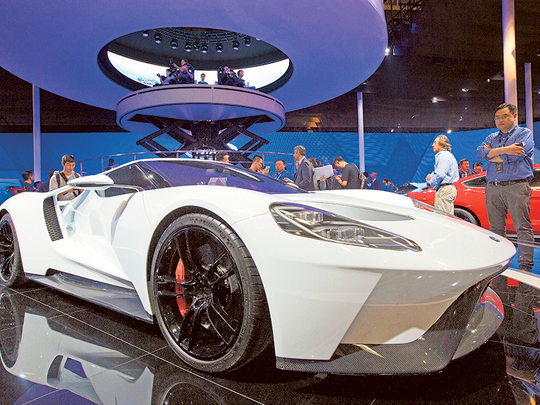
Beijing: A “slowdown” sure feels a lot different in China... and more so in its automotive market, the world’s largest by volume. This was quite visible in the run up to the Beijing Auto Show, which opened Monday, April 25.
First off, the slowdown looks like one only in comparison to the go-go growth rates put in during the first half of the decade, and when China toppled the US as the top market for new vehicle sales. But the first quarter numbers show that a good number of Chinese are visiting car showrooms and, more to the point, buying. And even in a tough year, a good number of Chinese does represent a significant base.
General Motors and its China-specific joint ventures announced they sold 946,000 units in the first three months, up by a marginal 0.2 per cent over last year. But, specific to its SUV line-up, volumes hit the fast track with a 148 per cent increase year-on-year. “In China, we continued to grow SUV sales and Cadillac expanded in the luxury segment,” said GM’s president Dan Ammann said in a statement.
And there’s Audi which recorded its best performance ever in March, pushing 50,986 cars out of its China dealerships. Total sales in the first quarter — 139,540 units from a 4.7 per cent gain.
During the same period, BMW turned in 120,810 BMW vehicles, an increase of 11.2 per cent over the same period last year.
All this in a market that slowed down considerably in 2015 and is yet to pick up on the momentum that propelled it in the first years of the current decade to be the world’s largest automotive market in the world. And last year, it still managed to sell 23.5 million and push it towards 25 million in the current one.
Carmakers are also changing the rules of the production and marketing games. No longer is there a too narrow focus on selling the most upscale of models to China’s swelling ranks of the super-rich. Even a well-off mid-income salary earner will do.
So, is the “new normal” for China’s auto industry better than par for the global manufacturers? “We do expect our sales in China to grow slightly compared to last year — but in such a volatile market it’s too early to be any more precise than that,” said Ian Robertson, Member of the Board of Management at BMW Group. The manufacturer delivered 463,736 vehicles on the mainland in 2015, of the 2.24 million it sold overall.
“So roughly one in five of all the vehicles we sold last year was sold in China,” said Robertson, who is also director of Sales and Marketing at the German marque. “To put that into perspective, we sold 999,669 BMW and MINI vehicles in Europe last year — that’s 45 per cent of total global sales.”
And in a nod to the times, with displays of extreme ostentatious being frowned upon by Chinese authorities, carmakers are changing their strategies around. For luxury brands, this means putting more of a push behind mid-range models.
“In the past, the BMW Group mainly sold its larger vehicles — the X5, X6 and 7 Series to a small group of customers,” said Robertson. “In the meantime, BMW serves a much larger customer base, with increasing demand for compact and mid-size models. This is also part of the “normalisation” of the Chinese market.
“Production always follows demand and so, in line with the increasing demand for these smaller models, we’ve been increasing our local production. With the new locally-produced BMW X1, we do expect to see our sales in China over the year grow compared to last year. But there are model cycle issues to be taken into consideration and the market continues to be volatile, so it’s too early to be more precise than that.”
While individual manufacturers have released theirs, the full set of 2016 first quarter auto sales data are yet to be out. “The perception on the dealers’ side is that the market has become stable on last year’s numbers,” said Mirko Bordiga, Head of Maserati China. “At the moment we cannot confirm if the feeling is supported by the registration data, though.
“At the current stage, the [Maserati] sales target for China remains unchanged.” The Italian manufacturer will have its first SUV model, the Levante, at the dealerships in July.
“The market reaction to the first round of previews in China has been extremely positive,” said Bordiga. “Considering that Levante will enjoy only six months of sales in the dealerships, we do think the volumes will be quite significant this year.”












